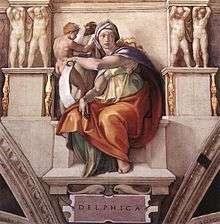sibyl
See also: Sibyl
English

Michelangelo's rendering of the Delphic sibyl
Etymology
Latin Sibylla, from Ancient Greek Σίβυλλα (Síbulla).
Noun
sibyl (plural sibyls)
- A pagan female oracle or prophetess, especially the Cumaean sibyl.
- c. 1603–1604, William Shakespeare, “The Tragedie of Othello, the Moore of Venice”, in Mr. William Shakespeares Comedies, Histories, & Tragedies: Published According to the True Originall Copies (First Folio), London: Printed by Isaac Iaggard, and Ed[ward] Blount, published 1623, OCLC 606515358, (please specify the act number in uppercase Roman numerals):: Act III, Scene IV:
- A sibyl, that had number'd in the world
- The sun to course two hundred compasses,
- In her prophetic fury sew'd the work;
- 1922 T. S. Eliot, The Wasteland: Epigraph (translated from 61 Petronius' The Satyricon: Chapter 8, Lines 80 -86)
- I used to read these tales in Homer when I was a lad. Then the Sibyl! I saw her at Cumae with my own eyes hanging in a jar; and when the boys cried to her, ‘Sibyl, what would you?' she'd answer, ‘I would die,'-- both of ‘em speaking Greek."
-
Translations
Anagrams
This article is issued from
Wiktionary.
The text is licensed under Creative
Commons - Attribution - Sharealike.
Additional terms may apply for the media files.